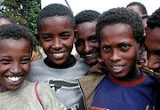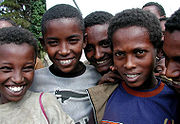
Etiquette in Africa
Encyclopedia

Etiquette
Etiquette is a code of behavior that delineates expectations for social behavior according to contemporary conventional norms within a society, social class, or group...
nor any list of faux pas
Faux pas
A faux pas is a violation of accepted social norms . Faux pas vary widely from culture to culture, and what is considered good manners in one culture can be considered a faux pas in another...
can ever be complete. As the perception
Perception
Perception is the process of attaining awareness or understanding of the environment by organizing and interpreting sensory information. All perception involves signals in the nervous system, which in turn result from physical stimulation of the sense organs...
of behaviors and actions vary, intercultural competence
Intercultural competence
Intercultural competence is the ability of successful communication with people of other cultures.A person who is interculturally competent captures and understands, in interaction with people from foreign cultures, their specific concepts in perception, thinking, feeling and acting...
is essential. However, a lack of knowledge
Knowledge
Knowledge is a familiarity with someone or something unknown, which can include information, facts, descriptions, or skills acquired through experience or education. It can refer to the theoretical or practical understanding of a subject...
about customs
Norm (sociology)
Social norms are the accepted behaviors within a society or group. This sociological and social psychological term has been defined as "the rules that a group uses for appropriate and inappropriate values, beliefs, attitudes and behaviors. These rules may be explicit or implicit...
and expectations within African cultures
Culture of Africa
The culture of Africa encompasses and includes all cultures within the continent of Africa. There is a political or racial split between North Africa, and Sub-Saharan Africa, which is in turn divided into a great number of ethnic cultures...
can make even the best intentioned person seem rude, selfish, or worse.
Generalizations
Although AfricaAfrica
Africa is the world's second largest and second most populous continent, after Asia. At about 30.2 million km² including adjacent islands, it covers 6% of the Earth's total surface area and 20.4% of the total land area...
represents an enormous expanse of geography with an incalculable amount of cultures and customs, noting the following points of etiquette can be useful when dealing with people around the world who have been raised according to African traditions:
Religion
A number of countries in Africa have many traditions based in IslamIslam
Islam . The most common are and . : Arabic pronunciation varies regionally. The first vowel ranges from ~~. The second vowel ranges from ~~~...
and share values with other parts of the Muslim world
Muslim world
The term Muslim world has several meanings. In a religious sense, it refers to those who adhere to the teachings of Islam, referred to as Muslims. In a cultural sense, it refers to Islamic civilization, inclusive of non-Muslims living in that civilization...
. As such, guidelines regarding etiquette in the Middle East
Etiquette in the Middle East
Many matters of etiquette in the Middle East are connected to Islam as it is written in the Qur'an and how it has been traditionally understood and practiced throughout the centuries...
are often applicable to these places. This holds especially true in Muslim majority countries which include many of the West African nations such as Senegal, Chad and Mali. Even though most people would consider themselves as Muslim, many mix it with local animism
Animism
Animism refers to the belief that non-human entities are spiritual beings, or at least embody some kind of life-principle....
. Many, whatever their religious adherence, to some extent believe in supernatural forces and that certain people, primarily doctors, herbalists, diviners, or marabouts (religious figures) have the power to utilise these forces. It is common to see people wearing amulets (called “gris-gris”) around their waist, neck, arms, or legs. People consult with diviners or marabouts to protect themselves against evil spirits, to improve their financial status or bring them love, to cure chronic illnesses, to settle disputes, or to place a curse on another person.
Tribal and ethnic groups
Africa is home to innumerable ethnic and social groups, some representing very large populations consisting of millions of people, others are smaller groups of a few thousand. The political map of Africa bears little resemblance to the "cultural map" of Africa, and national borders often cross through territories of people who consider themselves unified. Many Africans identify more closely as a member of a given ethnic or linguistic group than as a member of the nation in which they were born and hold citizenshipCitizenship
Citizenship is the state of being a citizen of a particular social, political, national, or human resource community. Citizenship status, under social contract theory, carries with it both rights and responsibilities...
. Accordingly:
- Oppugning someone's ethnic identity through ignorance or deliberate intention can be a grievous breach of etiquette.
- Adoption of a "Western lifestyle" has little to do with a person's affinity with their ethnic group. A lawyerLawyerA lawyer, according to Black's Law Dictionary, is "a person learned in the law; as an attorney, counsel or solicitor; a person who is practicing law." Law is the system of rules of conduct established by the sovereign government of a society to correct wrongs, maintain the stability of political...
in a three-piece suitSuit (clothing)In clothing, a suit is a set of garments made from the same cloth, consisting of at least a jacket and trousers. Lounge suits are the most common style of Western suit, originating in the United Kingdom as country wear...
en route to LondonLondonLondon is the capital city of :England and the :United Kingdom, the largest metropolitan area in the United Kingdom, and the largest urban zone in the European Union by most measures. Located on the River Thames, London has been a major settlement for two millennia, its history going back to its...
, able to converse in AfrikaansAfrikaansAfrikaans is a West Germanic language, spoken natively in South Africa and Namibia. It is a daughter language of Dutch, originating in its 17th century dialects, collectively referred to as Cape Dutch .Afrikaans is a daughter language of Dutch; see , , , , , .Afrikaans was historically called Cape...
and English, may also be a native speaker of ZuluZulu languageZulu is the language of the Zulu people with about 10 million speakers, the vast majority of whom live in South Africa. Zulu is the most widely spoken home language in South Africa as well as being understood by over 50% of the population...
and as proud and assured of his specific ethnic identity . - Conversely, pride in tribal identity means that wearing traditional dress does not necessarily indicate a lack of education or an unfamiliarity with the ways of the world. A man dressed in traditional Maasai attire may well have an education from a Western universityUniversityA university is an institution of higher education and research, which grants academic degrees in a variety of subjects. A university is an organisation that provides both undergraduate education and postgraduate education...
.
See also
- AfricaAfricaAfrica is the world's second largest and second most populous continent, after Asia. At about 30.2 million km² including adjacent islands, it covers 6% of the Earth's total surface area and 20.4% of the total land area...
- Culture of AfricaCulture of AfricaThe culture of Africa encompasses and includes all cultures within the continent of Africa. There is a political or racial split between North Africa, and Sub-Saharan Africa, which is in turn divided into a great number of ethnic cultures...
- Etiquette in AsiaEtiquette in AsiaAs expectations regarding good manners differ from person to person and vary according to each situation, no treatise on the rules of etiquette nor any list of faux pas can ever be complete. As the perception of behaviors and actions vary, intercultural competence is essential...
- Etiquette in Australia and New ZealandEtiquette in Australia and New ZealandExpectations regarding good manners differ from person to person and vary according to each situation. As the perception of behaviors and actions vary, intercultural competence is essential...
- Etiquette in Canada and the United StatesEtiquette in Canada and the United StatesEtiquette rules in the United States and Canada generally apply to all individuals, unlike cultures with more formal class structures, such as those with nobility and royalty....
- Etiquette in EuropeEtiquette in EuropeEtiquette in Europe is not uniform. Even within the regions of Europe, etiquette may not be uniform: within a single country there may be differences in customs, especially where there are different linguistic groups, as in Switzerland where there are French, German and Italian speakers.Despite...
- Etiquette in Latin AmericaEtiquette in Latin AmericaEtiquette in Latin America varies by country and by region within a given country.-Generalizations:There are several definitions of Latin America, but all of them define a huge expansive of geography with an incalculable amount of different customs, However, some generalizations can be made:*As...
- Etiquette in the Middle EastEtiquette in the Middle EastMany matters of etiquette in the Middle East are connected to Islam as it is written in the Qur'an and how it has been traditionally understood and practiced throughout the centuries...
- Worldwide etiquette

